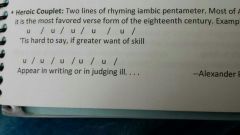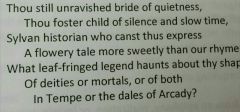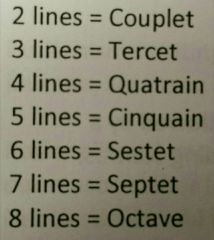![]()
![]()
![]()
Use LEFT and RIGHT arrow keys to navigate between flashcards;
Use UP and DOWN arrow keys to flip the card;
H to show hint;
A reads text to speech;
40 Cards in this Set
- Front
- Back
- 3rd side (hint)
|
antithesis
|
contrasting relationship between 2 ideas by joining them together or juxtaposing them often in parallel structure
|
|
|
|
apostrophe
|
direct address of a person or personified thing, either present or absent
|
|
|
|
assonance
|
the use of similar vowel sounds repeated in successive words
|
|
|
|
conceit
|
an elaborate metaphor that compares 2 things that are startlingly different
|
|
|
|
consonance
|
repetitions of a consonant sound
|
|
|
|
dramatic monologue
|
the occurrence of a single speaker saying something to silent audience
|
|
|
|
elegy
|
a poem of mourning
|
|
|
|
heroic couplet
|

2 lines of rhyming iambic pentameter
|
|
|
|
invective
|

an emotionally violent, verbal denunciation or attack using strong, abusive language
|
|
|
|
lyric poem
|
a poem that does not tell a story but expresses the personal feelings or thoughts of the speaker
|
|
|
|
metonymy
|

closely associated object is substituted for the object or idea in mind
|
|
|
|
ode
|

a poem in praise of something divine or expressing some noble idea
|
|
|
|
stanza types
|

|
|
|
|
synecdoche
|

|
|
|
|
villanelle
|

|
|
|
|
allegory
|
a form of extended metaphor in which objects and persons in a narrative are equated with meanings that lie outside the narrative itself
|
Ex: The Faerie Queene, Animal Farm, The Inferno, Lord of the Flies
|
|
|
allusion
|
a casual and brief reference to a famous historical or literary figure or event
|
|
|
|
ambiguity
|
deliberately suggesting 2 or more different and, sometimes conflicting, meanings in a work
|
|
|
|
archetype
|
a recurring symbol, character, landscape, or event found in myth and literature across different cultures and eras
|
|
|
|
cacophony
|
unpleasant combination of sounds
|
|
|
|
connotation
|
emotional content or common associations
|
Ex: 'chick' - "woman"
|
|
|
hyperbole
|
exaggeration used for emphasis
|
|
|
|
imagery
|
consists of the words or phrases a writer used to represent persons, objects, actions, feelings, and ideas descriptively by appealing to the senses
|
|
|
|
irony
|
a mode of expression through words (☆verbal irony☆) or events (☆situational irony☆) conveying a reality differ from and usually opposite to appearance or expectation. (☆Dramatic irony☆) is when the words and actions of the characters of a work literature have different meaning for the reader than they do for the characters
|
|
|
|
juxtaposition
|
poetic or rhetorical device in which normally unassociated ideas, words, or phrases are placed next to one another, creating an effect of surprise and wit
|
|
|
|
metaphor
|
a comparison which identifies one thing with another dissimilar thing
|
|
|
|
motif
|
a term that describes a pattern of strand of imagery or symbolism in a work of literature
|
|
|
|
mood
|
the atmosphere or predominant emotion in a literary work
|
|
|
|
narrative poem
|
a poem which tells a story
|
|
|
|
onomatopoeia
|
the use of words which in their pronunciation suggest their meaning
Ex: buzz, sizzle, crackle, bang, blam, zap, fizz |
|
|
|
oxymoron
|
a paradox reduced to 2 words usually adjective-noun (eloquent silence), or adverb-adjective (inertly strong) relationship
|
|
|
|
paradox
|
occurs when the elements of a statement contradict each other
|
|
|
|
parody
|
a satiric imitation of a work or of an authorized with the idea of ridiculing the author, his ideas, or work
|
|
|
|
personification
|
metaphorical representation of an animal or inanimate object as having human attributes
|
|
|
|
understatement
|
expressing am idea with less emphasis or in a lesser degree than is the actual case. opposite of hyperbole
|
|
|
|
syntax
|
the arrangement of words and the order of grammatical elements in a sentence
|
|
|
|
symbolism
|
the use or any object, person, place, or action that both has meaning in itself and that stands for something larger than itself such as a quality, attitude, belief, or value
|
|
|
|
pun
|
a play on words that are identical or similar in sound but have sharply diverse meanings
|
|
|
|
satire
|
a manner of writing to ridicule or irony or exaggeration
|
|
|
|
simile
|
direct comparison using like or as
|
|

